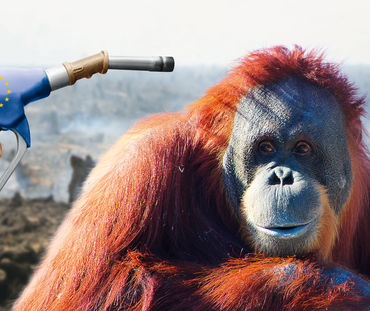Worldwide resistance against biofuels
Biofuels, Europe’s supposedly “green” alternative to fossil fuels, is wreaking havoc in the tropics: industrial-scale palm oil plantations are ravaging nature and robbing people of their land. Our partner organizations on the ground have written letters calling on the EU to scrap its disastrous biofuel policy without delay.
At 7.2 million tons annually, the EU is the third largest importer of palm oil after India and China. No less than 45 percent of the imported palm oil is used as fuel in motor vehicles. The EU mandates the blending of supposedly “green” plant-based diesel with conventional fossil diesel fuel. By 2020, diesel fuel will contain seven percent biofuel. Currently, the share is around five percent.
To support this demand, oil palm plantations are eating their way deeper into the rainforest, peat forests are going up in flames, endangered plant and animal species fall victim to the clear-cutting and people are driven from their land.
Explore the world’s palm oil conflict regions on our interactive map and read what activists on the ground have to say about the impact of the EU’s biofuel policy on their countries.
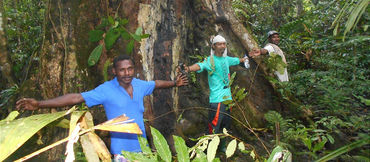
The Papuan land right alliance
The area cultivated for oil palms in the Indonesian provinces of Papua and West Papua has more than doubled as a result of the biofuels boom. The plantations currently cover one million hectares – an area more than twelve times the size of New York City.
In order to defend their ancestral home against further land grabbing by the palm oil barons, the Papuans have joined forces in a land-rights alliance. Together, they are documenting crimes on the plantations and organizing local resistance.
Letter from the Papuan alliance: “Papuans are dying so that people in the EU can drive cars”
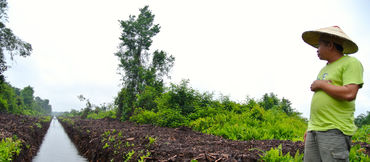
SADIA, Malaysia
Malaysia is the second largest palm oil producer in the world.
The first commercial oil palm plantations were established there in the early 20th century. They currently cover more than three quarters of Malaysia’s arable land.
Matek Geram of the SADIA alliance writes that in his native Sarawak in northwestern Malaysia, plantation companies have already destroyed more than 70% of the state's forests.
Matek is gathering evidence against palm oil companies that grab the land of villagers to establish plantations. He has taken numerous companies to court – and won.
Letter from Matek: “Palm oil cultivation and the violation of native land rights”
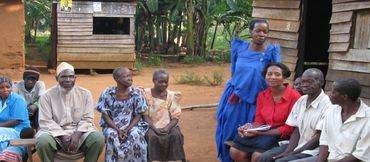
NAPE, Uganda
Oil palm plantations are being financed by the World Bank and the government of the East African country. Agribusiness currently has its sights on forest land on islands in Lake Victoria. The consequences for local people: land grabbing, food insecurity and water polluted by pesticides.
Our local partner organization NAPE is dedicated to exposing the crimes of the palm oil companies and supporting smallholders in organizing themselves against the onslaught.
Letter from NAPE: The negative impact of EU biofuel policies
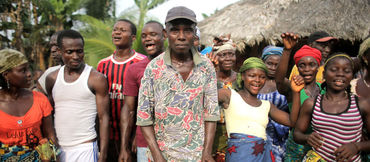
SDI, Liberia
Liberia is home to the largest intact rainforest areas in western Africa. The country, which has repeatedly been shaken by civil wars, stands to lose its natural treasures to industrial agriculture and the palm oil business. Revenues from palm oil exports increased by 90 percent between 2008 and 2012.
The Sustainable Development Institute (SDI) is an NGO that informs Liberian smallholders of their rights, assists them in publicizing cases of land grabbing and publishes studies on the situation on the ground.
Letter from SDI: “Land conflicts, human rights abuses and reinforcing poverty”
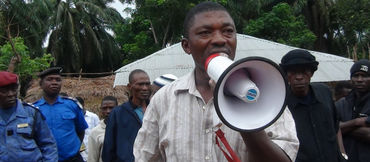
Green Scenery, Sierra Leone
Palm oil is the most commonly used cooking oil in Sierra Leone. Oil palms were traditionally cultivated in the ecologically valuable forest gardens of smallholders. However, the trend is moving toward export-oriented oil palm monocultures. Industrial agriculture already accounts for over ten percent of the western African country's land use.
Plantation operators and the police respond to protests against ongoing land grabs with arrests and intimidation.
The environmental and human rights organization Green Scenery is supporting the people in their struggle for their land and livelihoods.
Letter from Green Scenery: “EU biofuel policy is deciding the future of Sierra Leone”
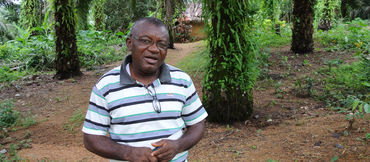
RRDC, Nigeria
There was a time when oil palms only grew in the forest gardens of indigenous people and smallholders. Since then, however, Nigeria has become the world’s third-largest producer.
Odey Oyama of the Nigerian organization RRDC reports that palm oil giant Wilmar International has gone as far as establishing plantations in a national park. With international support – and in the face of death threats – Odey has taken up the fight against the destroyers of the rainforest.
Letter from Odey: EU biofuel policies, poverty and environmental degradation in sub-Saharan Africa
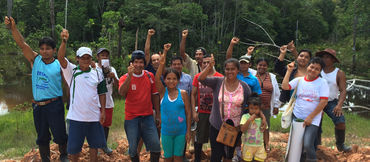
Kené, Peru
More than 100,000 hectares of Amazon rainforest are cleared in Peru every year. The expansion of oil palm plantations is the main driver of the destruction.
Our partners in the provinces of Loreto and Ucayali are standing up to the palm oil companies with information campaigns, protest marches and tactical land purchases. They receive legal support from the Kené Institute of Forestry and Environmental Studies. To date, more than 30 cases of illegal logging and land grabbing are pending.
Letter from Kené: The impact of palm oil in the Peruvian Amazon
Friends of the Earth, Ghana
The first oil palm plantations were established in Ghana in 1850. As demand for the cheap vegetable oil grows, smallholders without formal land titles are increasingly being driven off of their farms by international agribusiness corporations.
Friends of the Earth Ghana is committed to political action for the rights of the rural population.
Letter from Ghana: “...as if people and their livelihoods do not matter to sustainability”
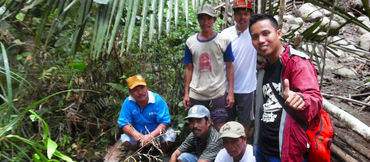
Link-AR, Indonesia
Indonesia is the world’s largest palm oil producer. More than 15.5 million hectares of the country – an area the size of England and Wales – is covered by oil palm plantations.
Link-AR is an NGO dedicated to fighting land grabbing and evictions on the island of Borneo. The organization holds workshops for smallholders and documents the crimes of the palm oil industry.
Letter from Link-AR: Palm oil for the EU instead of rice for the people












